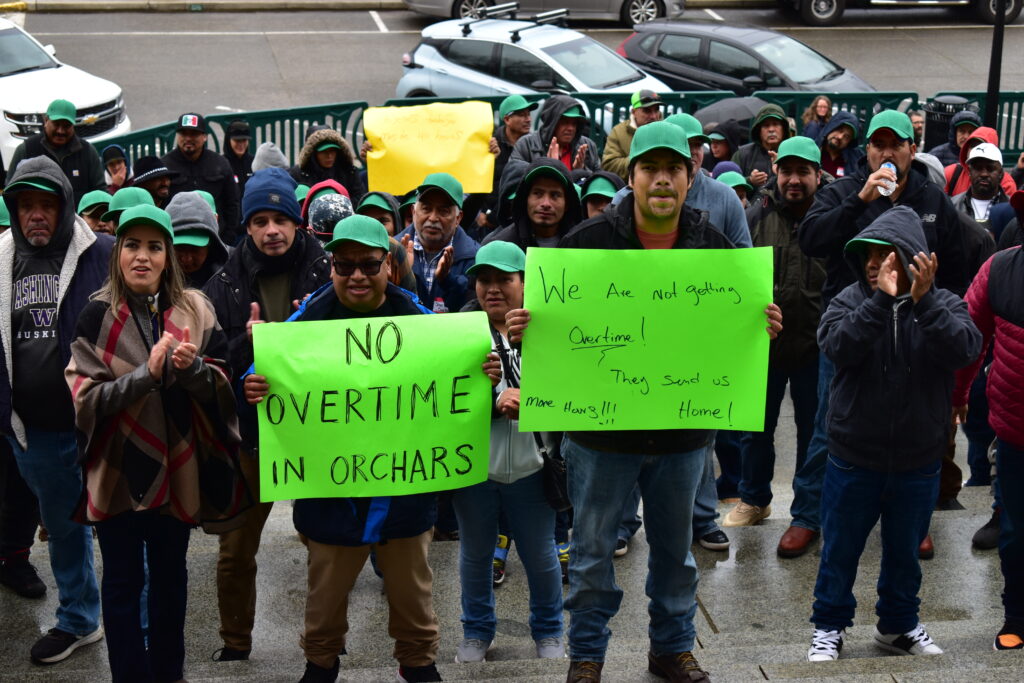
Agricultural overtime law still causing controversy
Listen
(Runtime 4:13)
Read
Farmworkers, farmers and advocates gathered at two events – all working to get lawmakers’ attention about a new agriculture overtime law. An annual tribunal defended farmworkers’ rights and the law. A separate rally focused on the negative impacts of the law.
Farmworkers started the 11th Farmworkers Annual Tribunal with a march through Olympia’s downtown, before meeting at the Capitol on Tuesday last week. There, they talked about the importance of getting access to health care, basic needs, environmental justice and concerns about the hiring of foreign temporary labor.
Senaida Perez, a farmworker from Nooksack, said companies are hiring more foreign temporary agricultural, or H2A workers, and it’s affecting local workers.
“They’re saying there aren’t a lot of people here working to harvest the season’s crop, but there are a lot of people here in the community, which is Nooksack, in Everson and in Lynden,” said Perez in Spanish.
Community to Community Development and the union, Familias Unidas por la Justicia, organized the tribunal each year.

Familias Unidas President Jose Ramirez and Vice President Tomas Ramon speaking with Representative Bill Ramos in Olympia. (Credit: FUJ Instagram / Edgar Franks)
Octavia Santiago is a board member of Familias Unidas por la Justicia. She said contracting H2A workers is also impacting local farmworkers overtime pay and they’re getting paid less.
“The company would rather spend tax payers subventions on more expensive labor systems like H2A instead of paying overtime to workers who already live here in our community,” said Santiago in Spanish.
Starting in January, farmworkers must receive overtime payment after 40 hours of work each week.
However, the law still causes controversy.
The Center for Latino Leadership, Vizionz Economic Development Center and Save Family Farming have organized rallies around the state to object to the law.
One of them took place in Olympia.
There, workers marched and asked for more hours instead of overtime, because they said they actually earn less money with overtime hours.
“The idea of this overtime was good but backfired. No está hacienda lo que era la intención,” said a farmworker during the rally.

Farmworkers participated in a rally in Olympia, to oppose to the agricultural overtime payment. (Credit: Courtesy Save Family Farming)
Marina Cabrera is a single mother farmworker who participated in the rally.
“I want my son to study and with 40 hours I won’t be able to help him. I want him to have a career. I don’t want my son to be like me. With 40 hours I won’t be able to, and I want my children to get ahead. It’s not fair,” said Cabrera in Spanish.
Maia Espinoza is the Center for Latino Leadership director.
“Workers are actually being hurt the worst by this law and we wanted to make sure that the workers had a voice to make sure that the legislators know how this law has affected them,” said Espinoza.
Espinoza said the law had good intentions, but it’s not sustainable for farmers.
“What’s happening is that the farmers have been unable to pay that wage or simply are predicting that they can’t afford it. So, they’re just hiring the next worker and just limiting people to 40 hours a week, if at all possible,” said Espinoza.
Espinoza said she thinks workers want the law to be repealed.
Rosalinda Guillen, executive director of Community to Community, has a different vision. She says the law is not the issue, but the industry practices.
“They actually tell farmworkers that their hours are being cut, and they’re going to earn less wages, because of the overtime law being passed. So, they’re turning it against the workers in their own right to have overtime,” said Guillen.
Guillen said she sees these practices as a political move to turn farmworkers against farmworkers.
“I don’t hear workers in other industries saying they want laws for not paying them overtime. I don’t understand why we are fighting with each other about this. It’s a benefit we deserve,” said Guillen in Spanish.
This week, the Senate Labor & Commerce Committee listened to testimonies about the proposed bill 5476. It proposes to authorize “agricultural employers to select 12 weeks a year to employ workers for up to 50 hours a week before overtime applies.”
April Clayton, a farmer, supports the bill.
“Just two months ago, my family made a devastating decision to shut down our farm for a second generation. Right now, we don’t know what the future looks like for our family,” said Clayton.
“Our cherry returns last year will not even cover one month of our chemical bills,” she added.
Alfredo Juarez, a farmworker from Skagit, is opposing the bill.
“The real reason workers are losing hours it’s not because the company can’t pay overtime. It’s because companies are bringing in H2A workers,” said Juarez.
“How is it a company can bring in his 20 workers and cover all those expenses but claim to go bankrupt if they have to pay overtime to local workers here,” he added.
Farmworkers from both sides agree the law has good intentions. But those who now are against say it’s not working and they’re getting smaller paychecks.
















